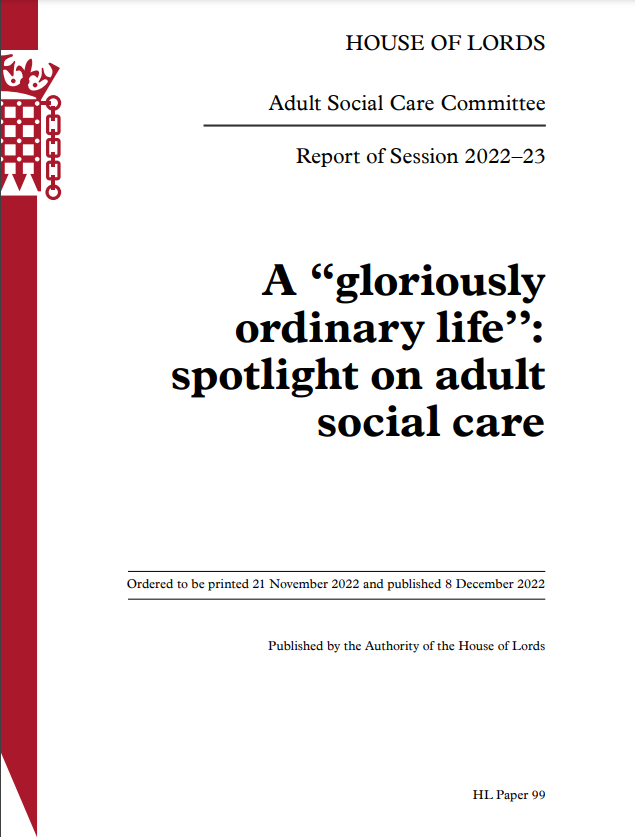Reflections on ‘A “gloriously ordinary life’’: spotlight on adult social care’
In the summer, I was honoured to be invited to give evidence to the House of Lords inquiry on adult social care. I was also, in all honesty, slightly daunted at the prospect. I have spent more than ten years engaging in qualitative research – speaking with carers and people drawing on care and support, traversing with them through their homes, neighbourhoods and lives; exploring photographs they have taken of the joys and frustrations of their everyday; heard accounts of events, circumstances and lives that have left me breathless with sadness and awe at the depths and heights of care and caring. I have heard the lengths those working in adult social care have gone to ensure people are well and safe in circumstances described in the language of ‘crisis’. I have listened to how people whose experiences of a hard to navigate and overstretched care system have inspired invention and innovation to try and ensure no one experiences the same challenges they did. People have shared with me the various ways technology can be a source of support and assistance, as well as exasperation.
The report
I carried all I have heard and seen in my research career – that evidence – in the forefront of my mind into the inquiry. The report ‘A “gloriously ordinary life’’: spotlight on adult social care’ was published this month. Based on the submissions of evidence by 200+ people with lived experience, carers, academics, commissioners, providers, front-line staff and representative groups from adult social care, it is a bold and much-needed call-to-action. It proposes resetting and recalibrating adult social care and the way we as a society view care and caring by activating promising policies that have lain ‘dormant’ in practice and for outlining change that goes beyond ‘merely tinkering’.
It begins at a very important place: underscoring the mundanity and everyday nature of care. It’s not a case that it could be any of us giving or receiving care at some point in our lives; it has been or will be. For that reason, care’s central place in society should be recognised. Its association with crisis and unending demand has served to narrow the aspirations for what adult social care can achieve: more than managing risks, discharge from hospital and inevitable decline, it should, as the title of the report indicates, ensure we all can lead lives that are ordinary, and in so being, glorious.

Giving evidence
The evidence given to the inquiry and the resulting report challenge many long-held assumptions about the nature of care, the public provision of adult social care and that ‘family first’ should bear responsibility invisibly and whatever the cost. In response, the report calls for choice for everyone over what care they receive and from whom, and in turn whether and what degree we provide care and to whom. Those who draw on care and support, the report argues should be at the centre of decision-making, representing a shift away from paternalistic and deficit-focused ways of thinking- key areas of promise for change highlighted by work of the IMPACT Implementation Centre. Regarding the provision of support, recent research by the Centre for Care and Carers UK highlighted that 12,000 people become carers every day in the UK- the degree to which this is a positive choice is an issue the House of Lords’ report highlights as important, pushing back on taken-for-granted characterisation of unpaid care. The increasing numbers of people ageing without children is also a key issue the report raises, again challenging the default family-centric approach often embedded in policy and practice.
The report also echoes stakeholders and voices from across the care sector who felt the 2021 White Paper did not go far enough in articulating concrete plans for change and progress. It calls for adult social care to become a ‘national imperative’, properly resourced and reformed with a workforce strategy. The need for data across the adult social care sector is also highlighted as a means to better understand the circumstances and challenges faced by people receiving and providing care and support; this aspiration is one shared with the Centre for Care and our Care Data Infrastructure team will contribute to.
I was asked to give evidence on a specific area in relation to adult social care: the role of technology in supporting independent living. In my session, I explored how ‘traditional’ approaches to using technology in adult social care have focused on managing risk. Now with the need to recommission analogue-based devices and systems, we have as I described when I gave evidence “a key driver for change, a key opportunity for change, aside from the advances in technology” and therefore the potential to consider how wellbeing can be enhanced alongside considerations of safety. While I felt ‘independent living’ is important, the ability to make and sustain connections is vital, and we shouldn’t ignore how technologies could facilitate interdependent living. I drew on examples from work from the Sustainable Care programme where we heard about examples of technologies being used in ways that support people to engage in activities they enjoy doing, to work, to socialise- but choice and the ability to blend different technologies together alongside other forms of support were key. Clive Gilbert from Policy Connect who was also in the session also suggested that it was often a case of “doing technology to people” rather than collaborating, consulting and coproducing with those drawing on care and support. Both myself and Clive emphasised that when designing services to support people, we need to move some away from ‘technology first’ approaches to emphasise outcomes foremost and the wraparound support people will need to truly benefit from technologies.
What next?
The report provides a blueprint for as it describes it a “fairer, kinder, more dignified and more sustainable adult social care system for all, which ensures that disabled adults and older people can live equal and meaningful lives, and that unpaid carers are supported and recognised for their extraordinary contribution”. With Centre for Care and IMPACT colleagues, in full collaboration with people with lived experience and policy and practice partners, I look forward to exploring the various ways this vision can be taken forward.
Dr Kate Hamblin is Senior Research Fellow at the Centre for International Research on Care, Labour and Equalities, University of Sheffield. She currently leads the Centre for Care’s Digital Care research theme and is the UK Networks lead for the IMPACT Centre.






